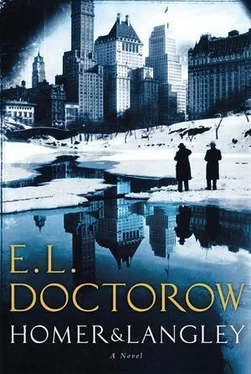LANGLEY’S CONTRARIANISM was to evolve. How could it not? When we learned that Harold Robileaux had joined up — this was sometime later, I don’t remember what year of the war this was — we displayed one of those little blue-star pennants that people hung in their windows to indicate that we had a family member in the service. Harold had gone and applied to the Army Air Forces and been trained as an airplane mechanic, this musician of all sorts of gifts and capabilities, and by the time we knew any of this he was overseas with an all-Negro pursuit squadron.So now our spirits were lifted, we were as prideful as any family in the neighborhood. For the first time in this war I felt a part of things. The times had brought people together and in this cold city of impassive strangers where everyone was out for himself a sense of community was like a surprisingly warm spring day in the middle of winter, even though it took a war to do that. I would go out for a stroll — I used a cane now — and people would greet me or shake my hand or ask if they could help me, under the impression that I had been blinded fighting for my country. “Here, soldier, let me give you a hand.” I didn’t think I looked that young but maybe I was perceived as an officer of formerly high rank. Langley exchanged greetings with home guards from the neighborhood on their way to the rooftops of their buildings to scan the sky for enemy planes. He bought War Bonds on our behalf, although I have to say not purely from patriotism but because he believed they were sound investments. There may have been a European battlefront and a Pacific front, but we were the Home Front, as important to the War Effort, as we canned the vegetables from our victory gardens, as G.I. Joe himself.Of course we knew there was a powerful propaganda machine behind all of this. It was calling on us to tamp down the fear of the maleficent enemy that resided in our hearts. I would go to the movies with Grandmamma just to hear the newsreels — the boom of our battleship guns, our grinding tank treads, our roaring flights of bombers taking off from English airfields. She would go in hopes of seeing Harold sitting in an airplane hut and looking up from one of the engines he was fixing to smile at her.We had no victory garden, our backyard had been given over to storage — things accumulated over the years that we had bought or salvaged in expectation of their possible usefulness sometime in the future: an old refrigerator, boxes of plumbing joints and pipes, milk-bottle crates, bedsprings, headboards, a baby carriage with missing wheels, several broken umbrellas, a worn-out chaise longue, a real fire hydrant, automobile tires, stacks of roof shingles, odd pieces of lumber, and so on. In an earlier time I had enjoyed sitting in that little yard where a shaft of sunlight visited briefly toward noon. There was some sort of weed tree there that I liked to think of as an offshoot of Central Park, but I was happy to give up the yard just to get some of these things out of the house because every room was becoming a kind of obstacle course for me. I was losing my ability to sense where things were. I was no longer the young man with the infallible antennae who could blithely circumnavigate the household. The Hoshiyamas when they were with us had brought up furniture from the basement with every intention of restoring things as they had been, but of course that was impossible, everything was different now. I was like a traveler who had lost his map, Langley couldn’t have cared less where anything went, and so the Hoshiyamas had used their own judgment and, as well meaning as they were, inevitably had gotten things wrong, which only added to the confusion.Oh Lord, and then one terrible day, the phone rang and it was this tiny tearful girl’s voice, barely audible. She was Ella Robileaux, Harold’s wife, calling long-distance from New Orleans, and she wanted to speak with his Grandmamma. I hadn’t known Harold had married. I knew nothing about it, but I had no reason to doubt her identity, this child of the tremulous voice, and it took me a moment to collect myself, for I understood without being told why she was calling. When I shouted back to the kitchen for Grandmamma to come to the phone my voice broke and a sob escaped from my throat. This was wartime, you see, and people didn’t make expensive longdistance calls just to chat.
BEFORE HE WAS shipped overseas, Harold Robileaux had made one of those little Victory records that soldiers sent home in the mail so their family could hear their voice. Little three-minute recordings on scratchable plastic records the size of a saucer. Apparently there were these recording studios in the same penny arcades near the army bases where you got four photos for a quarter or a bearded mechanical fakir in a glass case would lift his hand and smile and send your printed fortune out of a slot. So Harold had sent Grandmamma his V-record though it took some months to reach us. Until Langley thought to check the postmark it was unnerving to have found something from Harold in our mailbox. You understand this was after Grandmamma had heard from Ella Robileaux that Harold had been killed in North Africa. Perhaps the army censors had to listen to every one of these V-records just as they read every letter the soldiers wrote, or perhaps the post office in Tuskegee was overwhelmed. In any case when this record arrived in the mail Grandmamma thought Harold was alive after all. Thank you, Jesus, thank you, she said, crying for joy. She clapped her hands together and praised the Lord and would not hear from us anything about a postmark. We sat with her in front of the big Victrola and heard him. It was a tinny-sounding record but at the same time it was Harold Robileaux, all right. He was well, he said, and excited to have been promoted to tech sergeant. He couldn’t tell us where he was going or when but he would write when he got there. In that soft New Orleans lilt, he said he trusted that Grandmamma was well and to please give his regards to Mr. Homer and Mr. Langley. It was all what you’d expect from any soldier in the circumstance, nothing unusual, except, being Harold, he had his cornet with him. And being Harold, he put it to his lips and played taps as if offering the musical equivalent of a photograph of himself in uniform. The quality of that cornet’s sound overcame the primitive nature of the recording. A clear pure heartbreaking sound, every phrase lifted to its unhurried perfection. But why did he play the elegiac taps rather than, say, reveille, to indicate his affiliation with the army? Grandmamma asked Langley to play the record over, and then again three or four more times, and though we didn’t have the heart to discourage her, maybe it was that solemnly reflective dirge, the mournful tones filling all our rooms over and over, as if Harold Robileaux was prophesying his own death, that made her admit to herself, after all, that her grandson was gone. The poor woman, having been made to suffer his death twice, could not control her tears. God, she cried, that was my blessed boy you took, that was my Harold.Langley went out and bought gold-star pennants for the front windows of all four storeys, gold being the star for soldiers who had made what the politicians called “the ultimate sacrifice,” there being presumably a sequence of sacrifices a soldier could make — arms, legs? — before the ultimate one. Usually a single pennant with one star of blue or gold in a window was enough advertisement or consolation for a household, but Langley never did anything like everyone else. My brother’s sorrow was indistinguishable from rage. With the death of Harold Robileaux his whole attitude toward the war had changed and he said that when he finally prepared the front-page war dispatches for his eternally current and always up-to-date newspaper, its advocacy would be explicit. I look at all these papers, he said, and they may come at you from the right or the left or the muddled middle but they are inevitably of a place, they are set like stone in a location that they insist is the center of the universe. They are presumptively, arrogantly local, and at the same time nationally bullish. So that is what I will be. Collyer’s One Edition for All Time will not be for Berlin, or Tokyo, or even London. I will see the universe from right here just like all these rags. And the rest of the world can go on with their dim-witted daily editions, whereas without their knowing it, they and all their readers everywhere will have been fixed in amber.
Читать дальше












